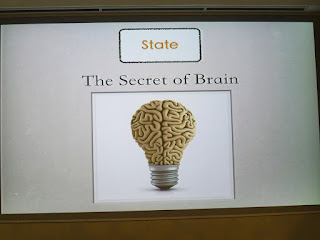ASQ
Local Member Communities (LMCs) Hong Kong organized a seminar named “From
Process Change to Human Change” on 14 July 2017 in CityU. Mr. Simon Tong, Mr. Karson Chui, Ms. Minda
Chiang and I were both HKSQ member and ASQ member attended the seminar. In the beginning, I took a photo with guest
speaker (Mr. Jeffrey Yip) and Mr. Simon Tong for memory. (Details about ASQ
organization outside USA/Canada stated in reference.)
In
the beginning, Mr. Simon (Chairman, ASQ LMC HK) introduced the guest speaker
and the coming events of ASQ LMC Hong Kong.
Mr.
Jeffrey Yip was our guest speaker and his topic named “The Law of Change”. His presentation included “three areas about
change”, “how language is important to facilitate change”, “where the motivation
factor is and how to dig it out”, and “why mindset is hard to change for some
people”, etc.
Firstly,
Mr. Yip introduced three areas about change and they were “Mindset” (心態), “State/Emotion” (狀態) and “Behavior” (行為). He said the easiest change was behavior and
the most difficult to be changed was Mindset.
He told us why people didn’t want to change because they were in their
conform zone. Mindset related to “Believe”. If people believe negative things, it could easily
form Vicious Circle (惡性循環).
Then
he introduced the Neuro-Linguistic Programming (NLP) to explain why language
was so important. He used NLP to
classify people sensitivity characteristics as follow types or combined types.
i)
Visual (視覺) – Visual Management,
demonstrated results/cases (e.g. 5S)
ii)
Auditory (聽覺) – Comments & feedback and
focused on wordings
iii)
Kinesthetic (觸覺) – touch / action and
relationship
iv)
Olfactory (嗅覺)
v)
Gustatory (味覺)
And
Linguistic related
vi)
Verbal (Listening is important)
vii)
Non verbal
In
addition, Mr. Jeffrey Yip introduced 19 questions to get the well outcome (KPI).
He
said Q1 to Q6 questions related to motivation that project managers were weak.
Q1
What do you want to achieve?
Q2
What would it look, hear, feel like?
Q3
Why is that important?
Q4
When?
Q5
Where?
Q6
With whom?
Project
managers were strong from Q7 to Q15.
Q7
What do you have to do in order to achieve your goal?
Q8
Is it in your power?
Q9
Do you have the capacity?
Q10
Have you done it before?
Q11
How many steps and stages need to do?
Q12
Do you have a plan or strategy?
Q13
Do you have the internal / external resources?
Q14
How will you monitor, what feedback do you need?
Q15
Does anything stop you or interference?
The
last four questions were commitment.
Q16
Is it ecological, realistic?
Q17
Is it compelling to you?
Q18
Are you going to do it, made a decision?
Q19
How will you know you have achieved it?
Mr.
Jeffrey Yip briefed the tools for “Mindset Change”. He said people would like to delete, distort
and generalize things in their mind. It was based on their “Meta Programs”, “Values”,
“Beliefs”, “Decisions” and “Memories”.
If people want to change, they must see themselves first.
Then
he explained that mindset had four elements and they were “Intention”, “Identity”,
“Value” and “Belief”.
Lastly,
he discussed “State” that was the secret of our brain. He told us why people’s emotion would frustrate
because of the gap between the expectation and the fact. Therefore, we needed expectation
management. He also mentioned that movie
mind affected our mindset (people would talk to themselves 30k per day like a
movie). If we would like to motivate
somebody, we needed to find either their fear or their desire. Sometime, human being motivated by their
feeling.
During
the Q&A session, he discussed how to change the team behaviors. He
suggested to find the opinion leader first.
Reference:
ASQ LMC Hong Kong - https://zh-cn.facebook.com/ASQLMCHK/
I would like to introduce HKSQ
relation with ASQ below. Our former
chairman Dr KS Chin (previous) and Dr. Albert Tsang (current) were ASQ Country
Counselors. Country counselors are
member leaders found in more than 40 countries. They serve as an ASQ point of contact
for members in their country, facilitating networking opportunities, acting as
a liaison to ASQ, and supporting the formation of local member communities
(LMCs) in their countries.
ASQ
Local Member Communities (LMCs) are member communities found outside of the
US/Canada. Being part of a member community near you will connect you with
other quality professionals in your geographic area. LMC members make new
contacts, network, and build knowledge through participation in local
activities and events. Participation in these activities and in LMC leadership
provides recertification units.
HKSQ is ASQ World Partner. ASQ
World Partners Program - ASQ wants to provide you with information to meet your
needs in your region. We partner with 20 organizations around the world —
groups with visions and goals that are in line with those of ASQ. This allows
us to support the needs of the global quality community and sustain a worldwide
environment for quality.










沒有留言:
發佈留言